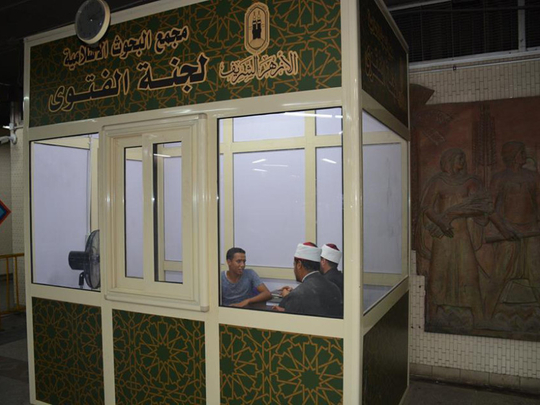
Cairo: Cairo subway authorities have closed a booth set up to explain Islamic rulings at the main station after a campaign by secularists against it.
They argue that the subway is no place for religious discourses and could alienate Egypt’s Christian minority.
The service started in mid-July at the subway’s Ramsis station in central Cairo with the declared aim of countering radical ideas and promoting Islamic moderation.
Clerics from the Islamic Research Centre, a body affiliated to Al Azhar, Egypt’s prestigious Sunni Islamic institution manned the free-of-charge service, locally known as the fatwa booth.
However, an official at the subway insisted the closure was not related to criticisms against it.
Ahmad Abdul Hadi, a spokesman for the subway system explained that the contract simply wasn’t renewed after it expired although the services it provided was very well received.
“There was a wonderful reaction from people of different ages and categories. The experience can be repeated,” he said.
More than 3 million people are estimated to use the Cairo subway system on a daily basis.
There has been no official confirmation from the Islamic Research Centre.
However, the agency’s head, Mohyi Al Deen Afifi, downplayed criticism of the service.
“Preachers’ work is not limited to certain places. They pursue their mission everywhere in order to reach the biggest possible number of people,” Afifi said in media remarks this week.
“Criticism on the social media did not mean failure of the fatwa committee at the Metro station. The proof is the large number of people, who sought advice from the committee during that short period,” he added without giving details.
Some 2,800 Muslims visited the booth on average per month, according to media reports.
Most sought-after fatwas (binding religious edicts) were related to inheritance, marriage, divorce and financial transactions.
“There was nothing bad about the Fatwa kiosk. On the contrary, its shaikhs were available most hours of the day to answer people’s questions and provide the religion’s views in a simple way,” said Abdul Qader Al Sayyed, a worker at a central Cairo restaurant.
“Having this service in this place [Ramsis station] was something good for people, who couldn’t go to Al Azhar or Dar Al Ifta to seek fatwas on different matters,” Al Sayyed, 49, added, referring to Egypt’s two institutions officially in charge of issuing Islamic edicts.
Around 500,000 passengers daily use the Ramsis station, also known as the Martyrs, according to Metro estimates.
Egypt has pursued a relentless crackdown on extremists in the country since the army’s 2013 overthrow of Islamist president Mohammad Mursi following mass protests against his rule.
Authorities have since tightened their grip on mosques across the country, denying Mursi’s now-banned Muslim Brotherhood and allies a main forum to influence devout Muslims.
The clampdown has also resulted in removing books promoting radicalism from mosques.
Since Mursi’s overthrow, Egypt has seen a spate of militant attacks mainly targeting security forces and Christians.












